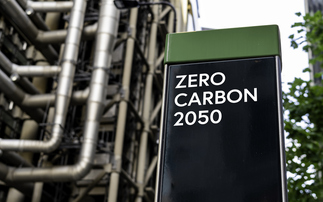Retailer's new 'Project Earth' initiative will see the firm work with its suppliers and brands to boost the sustainability credentials of its products as it works to become a more circular business by launching a range of in-store repair, recycle and reuse initiatives.
Selfridges has become the latest major brand to set out its strategy for delivering net zero carbon emissions, today unveiling a raft of stretching sustainability goals that include a promise to ensure that the majority of the environmentally impactful materials it uses in its products, packaging, and stores meet stringent sustainability certifications.
The luxury retailer has said that by 2025 it will only stock products that adhere to sustainable sourcing material requirements for plastic, cocoa, cotton, palm oil, wood and paper, leather, meat, feathers and forest-derived fibres.
"For a multi-brand retailer like Selfridges, to set targets like this is a big deal, and we won't be able to do it alone," said Daniella Vega, Selfridges' sustainability group director, at a media launch for the new strategy last week. "So we'll be really calling on our brands and suppliers to work in partnership with us to achieve these targets to achieve more transparency in our supply chains and source more responsibly."
The criteria that underpins each material's requirements have been developed with certification bodies and green groups, including Greenpeace, the Woodland Trust, and WWF. Progress will be reassessed annually, Vega said, insisting "it won't be something we launch and leave," she said.
The company is hoping the materials switch will allow it to achieve major carbon emissions reductions and support a newly-unveiled target of achieving a 30 per cent reduction in the carbon impact of its goods by the end of the decade.
Selfridges intends to become a net zero emissions business by 2050 and achieve a preliminary 2030 target of reducing its greenhouse gas emissions by 64 per cent against a 2018-2019 baseline.
All targets are in line with a 1.5C warming scenario and have been validated by the Science Based Targets initiative, the retailer said.
Managing director Anne Pitcher emphasised that the new sustainability programme marked a major step change for the company that would see it "reinvent retail by putting people and planet at the heart of our thinking".
"Sustainability was once a department, with some people in it who said ‘this is what you should do'," she said. "Sustainability is now central to our thinking and our ambitions, and I would go so far to say sustainability is our business plan."
Pitcher said the new strategy made Selfridges the first department store in the world to set "tough material requirements" as part of a plan to reduce the impact of its Scope 3 supply chain emissions.
In an attempt to reduce its reliance on virgin materials and its production of waste, Selfridges is also today launching a number of initiatives geared at making its operations more circular. These include a new rental clothes collection, an in-store and virtual 'repairs concierge' service dedicated to fixing customers' worn items, and a temporary second-hand accessories and clothes shop.
In addition, the company today revealed it is launching a new labelling scheme that it said would signpost customers in store and online to organic, vegan, or reduced waste products.
Pitcher admitted the new sustainability programme was being launched in the midst of "an incredibly tough year" given the coronavirus' devastating impact on retail and a major reorganisation within Selfridges that will see it shred 14 per cent of its staff. However, she argued that "we all have to understand that there is a future, and reinventing retail will allow us [a] sustainable future".
When questioned by journalists on her opinion on the pedestrianisation of Oxford Street, the busy London artery that is home to Selfridges' flagship store, Pitcher confirmed that she continued to support the now-shelved plans.
"The environment with which we shop is is critical to whether or not we are out shopping," she said. "We need to ask ourselves whether Oxford Street - and not just Oxford Street, all of our town centres and cities - are comfortable, easy and enjoyable places to shop. And secondly [we need to ask] how do we protect the environment? Of course Oxford Street should be pedestrianised."
The project, which would significantly reduce pollution and collisions along the street, was axed in 2018 after opposition from local residents, despite receiving overwhelming support in a public consulation. Campaigners continue to remain hopeful that post-pandemic plans to minimise congestion and encourage active transport could yet see the proposals revived at some point in the future.
The Net Zero Leadership Hub is brought to you in partnership with BT, as part of its support for the Net Zero Leadership Stream at the world's first Net Zero Festival this autumn. All the content on the Hub is fully editorially independent unless otherwise stated. You can find out more about the Net Zero Festival and reserve your place here.










